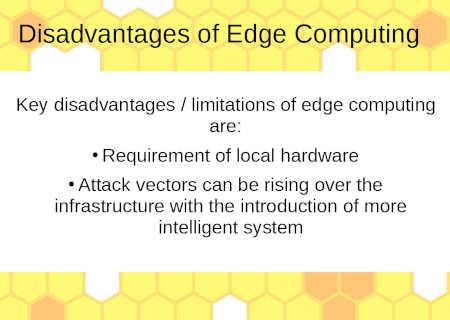advantages and disadvantages of edge computing

#image_title
In today’s world, we are constantly connected to the internet, and with the Internet of Things (IoT) becoming more and more prevalent, the amount of data being generated is only going to increase. We need a way to process this data quickly and efficiently, and that’s where edge computing comes in. In this article, we’ll be exploring the benefits of edge computing, and how it’s changing the way we interact with technology.
What is Edge Computing?
Edge computing is a distributed computing model in which data processing takes place near the edge, or network periphery, rather than at a centralized location like a data center. This allows for faster data processing and closer proximity to the devices generating the data.
Advantages of Edge Computing
Reduced Latency
One of the biggest advantages of edge computing is reduced latency. With data processing happening closer to the device, the time it takes to send data to a centralized location for processing and then back to the device is greatly reduced. This is especially important for real-time applications like autonomous vehicles, where even a small delay in processing data can have serious consequences.
Improved Security
Edge computing also offers improved security. Since data is processed closer to the device, it drastically reduces the surface area for potential attacks. In addition, edge devices can be configured to handle security measures like encryption and authentication, making it more difficult for attackers to gain access to sensitive data.
Reduced Bandwidth Requirements
With edge computing, only relevant data needs to be sent to a centralized location for processing, reducing the amount of data that needs to be sent over the network. This reduces bandwidth requirements and can save on costs associated with data transfer.
Increased Efficiency
Edge computing also increases efficiency by reducing the amount of data that needs to be processed at a centralized location. This allows for more efficient use of resources and can lead to cost savings for businesses.
The Future of Edge Computing
The future of edge computing looks bright, with the market expected to grow significantly over the next few years. The increasing use of IoT devices and the need for real-time data processing will continue to drive demand for edge computing solutions. In addition, advances in technology like 5G networks will enable even faster data transfer and processing, making edge computing an even more attractive option.
Conclusion
Edge computing is a game-changer for the way we interact with technology. It offers improved security, reduced latency, and increased efficiency, making it an attractive option for businesses that rely on real-time data processing. As the market for edge computing continues to grow, we can expect to see even more innovation in this space.
Xbox vs PlayStation
Another hot topic in the tech world is the age-old debate of Xbox vs PlayStation. Both gaming consoles have their pros and cons, and it can be difficult to choose between them. In this section, we’ll be exploring the differences between Xbox and PlayStation, and what sets them apart.
Xbox
Pros
- Xbox Game Pass – With over 100 games available to play for a low monthly fee, Xbox Game Pass is a great value.
- Backwards Compatibility – Xbox consoles are backwards compatible, meaning you can play older games from previous generations.
- Controller – Many people prefer the Xbox controller, which has been praised for its ergonomics.
Cons
- Exclusive Games – Xbox has fewer exclusive games than PlayStation, which may be a turn-off for some gamers.
- Less Powerful – Xbox consoles are generally less powerful than PlayStation consoles, which may affect performance in certain games.
- UI – Some users find the Xbox user interface to be less intuitive than PlayStation’s.
PlayStation
Pros
- Exclusive Games – PlayStation has a larger selection of exclusive games, which may be a selling point for some gamers.
- VR – PlayStation VR is a popular virtual reality headset that works with the PlayStation console.
- More Powerful – PlayStation consoles are generally more powerful than Xbox consoles, which may offer better performance in certain games.
Cons
- No Backwards Compatibility – PlayStation consoles are not backwards compatible, meaning you can’t play older games from previous generations.
- Controller – Some users find the PlayStation controller to be less ergonomic than the Xbox controller.
- Price – PlayStation consoles are generally more expensive than Xbox consoles, which may be a deterrent for some consumers.
Conclusion
Ultimately, the choice between Xbox and PlayStation comes down to personal preference. Both consoles have their pros and cons, and each offers a unique gaming experience. Whether you prefer the value of Xbox Game Pass or the exclusive games of PlayStation, there’s no right or wrong answer. It’s all about finding the console that’s right for you.




